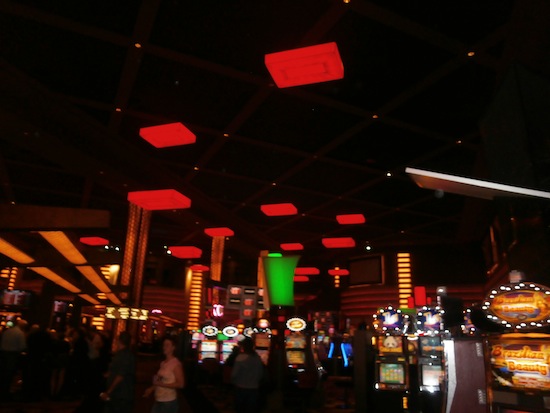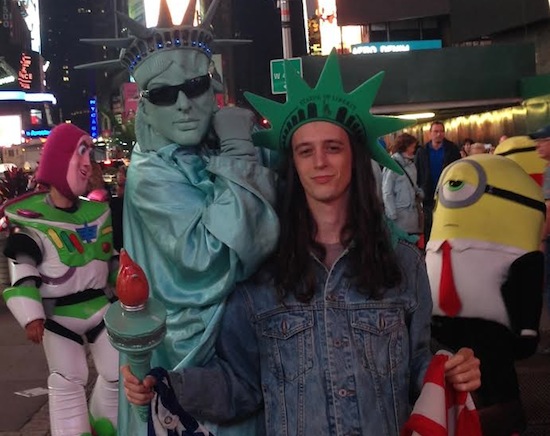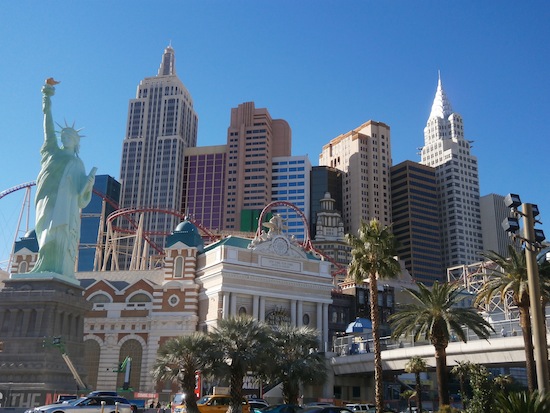Gambling is an insane concept: putting one’s self at risk for the sake of a highly contingent, purely possible other self. Adrian Rew is fascinated with the desire for that possible future self endowed with something that the present self lacks as it walks through the sliding glass doors of a casino. That’s because the desire to gamble is not easy to describe, being a lot more complicated in most cases than a simple desire for material wealth.
Shortly after finishing his undergraduate studies at Oberlin College, Adrian found himself pursuing this question in the form of a set of field recordings. They turned out to be Slot Machine Music Vols. 1 and 2, originally released on his own label Ergot Records, the first of which has recently been reissued by Aaron Dilloway’s Hanson Records imprint.
Rew prepared for the project with thorough research, and learned that what the real slot machine addicts crave about the experience is time on the machine, framing the high in those terms much more so than in a desire for monetary reward. The "zone" is the name for that highly addictive experience of time on the machine, and Rew poetically describes it in an essay released alongside the original release of Slot Machine Music:
"Video gambling addicts, academic researchers, and industry professionals alike describe the trancelike state into which problem gamblers suspend themselves with remarkable consistency: they unanimously call it the machine ‘zone’, a kind of inner experience during which the rhythmic flow of human-machine collusion borders on mysticism. Time is abolished in the act of contemporary video gambling – simulated slot reels roll, virtual poker decks deal, and all worldly concerns are lost – leaving only the aura of total zone immersion in its wake. Sometimes characterised as the crack cocaine of gambling, the intensity of the machine zone is a symptom of casino ergonomics: oxygen-saturated pleasure air, subtly controlling walkways, mesmerising lights, and, as captured here, meticulously engineered sonic environments all play a role in evoking the timeless void of the zone."
If Rew’s writing about the project – he also did a piece for The Wire on it – seems a little mystically engaged, that’s probably not an accident. The reason Slot Machine Music followed so directly after the end of college was because he had just finished writing a thesis on Georges Bataille, a thinker famous for his spiritually revelatory visions of excess and his notions of what the total pursuit of it opened up for human experience. Bataille writes that in absolute pursuit of excess, one loses their sense of self and becomes able to transcend the human condition. The inspiration is clear: Adrian wandered around casinos for a total of 20 hours, trying to let his self be completely commanded by the sounds, guided through what he calls the "flow" of the casinos.
Adrian’s project couldn’t be more timely, as the concept of gambling is particularly evocative and loaded in this contemporary moment. A particularly pressing example of this is futures trading, a dominant practice in the current economy whereby speculative investments are made on economic arrangements that are much more contingent and relative than investments in commodities or businesses. A little like betting on the arrival of a particular deck of cards. Although in conversation Adrian de-emphasised this slot machine comparison in favour of one to immaterial screen culture, this just shows that the horizontal adaptability of the framework his work provides proves to be one of the most exciting, productive things about the project.
Can you give me a sense of what you were thinking about when this project came about? Did it happen because you just liked going to casinos?
AR: I had actually never been until a year and a half ago. A friend of mine had been going and he brought me. I had no expectations because I had never been.
Were you going to gamble?
A: I had written my senior thesis at Oberlin on Georges Bataille. He was a big gambler. A lot of his philosophy revolves around accumulation and expenditure. He’s really into the state of expending himself completely, which is kind of a mystical thing for him – gambling plays a big role in that because you risk yourself by gambling, which itself puts you to the limit or beyond the limit, which becomes mystical. And then the almost inevitable loss itself also kind of exists in a free zone. But a lot of his writing revolves around the impossibility of expressing that state through writing – the state of freely blowing everything. That’s the ultimate state for him, he calls it "sovereign". The Marquis de Sade is an ideal example of this because he was a loaded noble who could just do anything. So I was struggling writing my thesis about this state because Bataille himself has trouble expressing it. I thought, "I should go to the casino to see if it would give me some inspiration."
Tell me a little about your thesis.
AR: I focused on the period of Bataille’s work where he mainly wrote on Nietzsche and inner experience. He’s just obsessed with Nietzsche and this kind of summit state that you have to throw yourself down from. The summit is your peak – wealth or something. That allows you to be entirely free; it’s an unsubjugated state. But he struggles writing it. It’s all about this interior struggle to express something that resists expressing. In those books he also kind of rewrites Nietzsche in a sense and kind of becomes him, almost repeats him as this free thinker who is able to tap into this state. I was kind of treating Bataille as my Nietzsche and trying to write Batille, about him and through him.
Was it strictly philosophical writing or were you writing about Bataille through specific subjects?
AR: It kind of of oscillated between the two. The core of my thesis was how to write sovereignly, which as I said, is an issue for Bataille. Writing presupposes a communication for posterity, which is at odds with living in the moment. One who lives in the moment shouldn’t need to write. Speak maybe. So I was trying to live in the moment and go to the casino instead of writing.
But then you chose to record it.
AR: That was not the first visit. But indeed that’s a struggle that exists in the recordings for me. It’s the same thing. For me the zone that I wrote about, the mystical state that the gamblers enter, the timeless state. For Bataille, sovereignty is also timeless. The zone you enter is this state of expenditure, you’re gambling away everything indefinitely, with no end in sight. It’s totally a zone, you’re free, nothing matters in the zone because you’ve stopped caring about money. So I tried to capture the zone experience with my recordings, but in truth it’s impossible to do so with recording because I had an end in mind. I tried to get there as closely as possible by wandering around and just letting the space control me, but as much as I would love for it to be a true expression of that, you still have to be careful not to bump into people with your microphone. So it’s still sort of a paradoxical project because it transmits the sounds of the zone, without the recorder, me, being entirely inside of it.

Can you talk to me more about how you see gambling as this state of the sovereign?
AR: There’s a zone and there’s the sovereign: I think they’re the same thing, to a certain extent. Bataille worked at the national library in Paris. He would work a lot and then just blow all his cash every weekend on whores, gambling and alcohol. Sex was also a mystical thing: it was the same thing as blowing your money or losing yourself in the role of the dice. There were all these things where you lose yourself, and that was how he saw god, that was his experience of god. Nietzsche was his god, kind of. But Nietzsche says, "God is dead, must we not all become gods to become worthy of the death of god." So it’s kind of like Bataille becoming a god himself to cope with his love of Nietzsche.
Getting back to the sovereign thing, you have to start high to be able to fall. So a lot of the people at casinos are broke, but I think they are able to enter a state of timelessness by losing it all. Addicts, they lose everything. If you go in there with a hundred bucks and say that’s all you’re going to spend, I don’t think you’re going to enter the zone. To truly enter it you have to lose yourself and stop caring about money.
What it comes down to is money is linked to time, which is an oppressive force that is linked to death. We fear death and we act accordingly. We’re prudent because we know that we have to keep on surviving. In order to overcome this fear of death and time, we need to abolish care for the things that are symptomatic of it. Money – money controls everything – money is that main force. So by expending money freely you’re able to, some are able to, overcome the anxiety of and the existential angst and everything that is caused by time and death. But it’s a death in itself, it’s a liberation from these worldly concerns where you’re getting into this rejection of time, of money. And that brings you closer to a non-human state.
One thing that I’m thinking of is a comparison of this scenario with futures trading and the stock market, which is another kind of gambling, of course. It’s an extreme devaluation of humans and anything that isn’t profit in favour of an excess of profit, following a similar formula.
AR: I do think that in the stock market, the goal is always to make money. Maybe there are some fucked up masochistic stockbrokers who love losing money, but I don’t know anything about that. But I think for slot machine gamblers, that’s not the goal.
Really? They don’t want to make money?
AR: I mean, they want money. Who doesn’t want money? But from what I’ve read, which is a decent amount, they don’t see it as money, but rather as time on the machine. That’s time during which you’re lost and you don’t have to think about anything. It’s an escapist thing in a sense. I’ve seen gamers cover the screen that says how much credit you have left – I’ve seen them cover it with cards so that they don’t know. That’s because they want to be in that state without knowing that exit is possible.
People really love the machines that allow you to play the longest rather than those that have the potential to win the most money. The people who talk about the zone and try to enter the zone, it’s all about maximum time on the machine, the experience, rather than any real hope of making money. If they win big, they just put it back in.
While on the one hand I hear what you’re saying about freeing up time in the face of capital, on the other, isn’t capital always winning, dominating people?
AR: It always will. That’s life, man. [laughs] I think the state people enter is real, I think it is legitimate, but I think there are better ways to tap into it than a casino. There are ways to get into the zone everywhere in our lives and we’re always kind of tied to it, at least in America.
Would you say that your music builds on the tradition of industrial and noise music – Throbbing Gristle is a big example – working with this very Bataillian idea of liberation through assimilation? Throbbing Gristle made music with factory sounds, producing a distorted mimesis of commodity culture, talking like crazy people on TV…
AR: Yeah. "Industrial music for industrial people." My recordings are about using the space in an emancipatory way, like Throbbing Gristle used the sounds of machines to make music, I wanted to wander through the casinos like the Situationists wandered through their cities in order to use the control embedded into the space for something that it wasn’t meant for. Using it as a readymade…
What are some other iterations of the zone?
AR: Intoxication is one. Sex. Transcendental experience. We’re stuck in our computer zone all day. We’re really tied to our video machines. We look to them for affective reward. If the industrial workday was tied to doing this thing [does machine-operating gesture] repeatedly, which is what [Einstürzende] Neubauten did on stage, now our primary mode of production, at least for people that I know, is this fucked up computer world. We trade in things we don’t even see. When you gamble with money that’s not even money – money already doesn’t mean anything. It’s already a referent! But we’re using referents of referents and things are starting to not make sense. Or, not make material sense.
So we’ve talked about this style of turning non-art into art as a project of resistance. Have there been any experiences of art that have reminded you of casinos?
AR: Certain sound installations or sound performances have reminded me of casinos. La Monte Young’s Dream House or Pauline Oliveros’ Deep Listening Room, Florian Hecker’s Chimerization. That one especially, the project with all the insane, hybrid voices, it sounds a lot like the casinos.
I’ve been recording at Times Square a little bit. It reminds me a lot of casinos because of the lights and everything. I’m really interested in plagiarism and recording other people’s work, using the recording as a subjective interpretation of it. Have you been to the Max Neuhaus installation in Times Square? There’s like a traffic island with a grate on it and it’s got a drone that comes out of it. It’s pretty subtle, you wouldn’t really notice it unless you knew it was there. Times Square is crazy because it has that installation, but also there are huge American flags everywhere, but then there’s also an ad for the MoMA with Jasper Johns’ flag pieces. So you got like these art ads and then American flags right there next to the real thing. I don’t even know what’s going on with that… For me it’s great: you see a Jasper Johns and you’re like, "Oh yeah." But for all the tourists there, the MoMA is a place where art is reified, it’s just another spectacle.

At that sound installation I was recording, there were two guys dressed up as the Statue of Liberty, making money off taking photos with tourists. One of them came up to me because he noticed I was recording. He asked me about the piece because he knew it was an installation, and he said that they didn’t know about it for a while but it started driving them crazy, the people who worked there. He said it was "shit art". He said he recorded some trashcans with his Zoom recorder and they sounded exactly the same. It’s crazy to have the Jasper Johns and the American flag, and the sound installation, and the Statue of Liberty person telling me it’s shit. It’s just an insane place where art is mixing with late capitalism at its most intense. It’s fucked up, a little like a casino. I don’t even know what it is. It’s just America.
Slot Machine Music is reissued on Hanson Records


